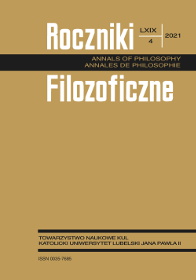The Logical Construal of Questions and Answers: Substantive and Methodological Remarks
Abstract
In this article I address the contributions of Anna Brożek, Marek Lechniak and Jacek Wojtysiak as formulated in the course of their discussion of my monographic study Pytania i odpowiedzi. Ujęcie teoriomnogościowe [Questions and answers: A Set-theoretic approach]. My responses in the article are divided into substantive and methodological ones, depending on whether the comments and suggestions for improvement formulated in their contributions refer to the actual conception proposed in the book or to the methods used in its construction.
In my substantive comments, I respond to issues relating to the structure, types and accuracy of questions. I argue that: (i) the schematisations of question structure proposed in the monograph are a development of the so-called “Polish schema” that is such as to make it possible to exhibit and remove the elements of ambiguity in any interrogative sentences and questions based on them; (ii) although the general schematic structure is common to all questions, the division of questions adopted in the monograph—especially into questions to be resolved and others—is substantively justified and logically correct; (iii) the claims put forward regarding the relations between the accuracy of questions and the truth of their assumptions are correct—even though a general inference to the accuracy of the questions at issue from the truth of their assumptions requires (as J. Wojtysiak has observed) an additional condition to be met.
My methodological remarks concern the so-called component-combinatorial method of analysing questions, the notion of so-called “generalised negation”, and the evaluation of the philosophical methods on display in the monograph in the light of the relevant model of the philosophical method (as described by A. Brożek). I show that: (iv) the method of representing and analysing interrogative sentences used in the monograph provides a tool for distinguishing all of their possible meanings (possible questions), which in the reconstruction of question situations narrows down the analyses to questions that comply with the rules of language (excluding as it does the construction of meaningless combinations, as warned against by M. Lechniak), while on the other hand enabling it to be the case that out of the total number of possible ones, only questions relevant in a given situation are taken into account; (v) the negation non, though ultimately based on propositional negation ~ (it is defined by disjunction Ú and negation ~), is its generalisation, since it can be applied not only to the whole matrix p of the question “Is it the case that p?”, but also to any of its parts, right down to its individual components, and at the same time is equivalently replaceable with ~ in the situation of negation of the entire matrix p; (vi) the mode of philosophising that I have employed in the monograph is consistent with a method combining analysis, paraphrasing, and axiomatisation, even if it is far removed from model axiomatisation especially, and needs further completion in respect of the so-called theoretical “verbal corpus” — i.e. in terms of the references it makes to other conceptions of questions and answers.
References
Ajdukiewicz, Kazimierz. 1975. Logika pragmatyczna. Warszawa: Państwowe Wydawnictwo Naukowe.
Brożek, Anna. 2008. Pytania i odpowiedzi. Analiza krytyczna koncepcji Kazimierza Ajdukiewicza, „Zagadnienia Filozoficzne w Nauce” 42 (2008):147–152.
Brożek, Anna. 2007. Pytania i odpowiedzi. Tło filozoficzne, teoria, zastosowania praktyczne. Warszawa: Wydawnictwo Naukowe Semper.
Brożek, Anna. 2021. „Pytania w opisie analitycznym. Logika erotetyczna z metodologicznego punktu widzenia”. Roczniki Filozoficzne 69, nr 4: 259–280 (tekst z tego numeru RF).
Jadacki, Jacek. Spór o granice języka. Elementy semiotyki logicznej i metodologii. Warszawa: Wydawnictwo Naukowe Semper.
Jonkisz, Adam. 2019. „Wieloznaczność zdań pytajnych”. Filozofia Nauki nr 4: 115–134.
Jonkisz, Adam. 2020. „Struktura pytań”. Filozofia Nauki nr 1: 25-60.
Jonkisz, Adam. 2020. Pytania i odpowiedzi. Ujęcie teoriomnogościowe, Kraków: Wydawnictwo Naukowe Akademii Ignatianum w Krakowie.
Jonkisz, Adam. 2016. O wyrażeniach i nazwach. „Studia z Filozofii Polskiej” 11: 39-56.
Koj, Leon. 1998. „Próba zdarzeniowej teorii znaku”. Studia Semiotyczne 21–22: 27–46.
Koj, Leon. 1989. „Inquiry into the Structure of Questions”. W: Inquiries into the Generating and Proper Use of Questions, red. Leon Koj i Andrzej Wiśniewski, 33–60. Lublin: Wydawnictwo Uniwersytetu Marii Curie-Skłodowskiej.
Lechniak, Marek. 2021. „Czy da się pominąć ontologię? Uwagi na marginesie Pytań i odpowiedzi Adama Jonkisza”. Roczniki Filozoficzne 69, nr 4: 281–303 (tekst z tego numeru RF).
Wojtysiak, Jacek. 2021. „Kilka wątpliwości co do Adama Jonkisza teorii pytań”. Roczniki Filozoficzne 69, nr 4: 305–314 (tekst z tego numeru RF).
Copyright (c) 2021 Roczniki Filozoficzne

This work is licensed under a Creative Commons Attribution-NonCommercial-NoDerivatives 4.0 International License.





